Three bodies were recovered Monday from British Columbia's Garibaldi Provincial Park where a trio of mountaineers went missing more than a month ago.
In a statement released by Squamish RCMP, BJ Chute, the manager of Squamish Search and Rescue, said the team worked with police to carry out the recovery operation in the Atwell Peak area on the edge of Mount Garibaldi.
RCMP did not release the names of those who died, saying their families have requested privacy.
The three mountaineers were last seen on May 31 in terrain that Squamish Search and Rescue member Christy Allan described as "really complex and remote."
The early days of the search operation were hampered by poor weather conditions, including a high avalanche risk and low visibility in the backcountry area about 70 kilometres north of Vancouver.
At the time, Allan said search members would usually access the area by air and ground, but the winter conditions made it difficult. A crew was able to make it to the shelter at Elfin Lakes in the park, she said, but they later had to pull back.
On June 6, nearly a week after the trio went missing, Squamish Search and Rescue shared an update saying helicopters, groundcrews, drones and avalanche dogs were involved in the effort to find them. It said one helicopter was equipped with a rescue-signal detector, though low cloud cover continued to hamper the search.
A subsequent update later that day said the team had temporarily suspended the search, while another advisory two days later said they hadn't completely stopped looking.
The June 8 statement said the team was switching tactics, opting to review aerial video footage given the "dangerous terrain" and conditions on the ground.
The RCMP and BC Coroners Service are now investigating the deaths.






